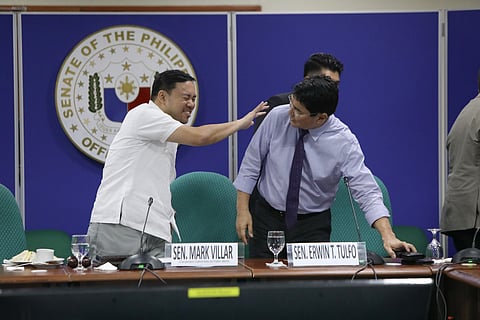
- NEWS
- the EDIT
- COMMENTARY
- BUSINESS
- LIFE
- SHOW
- ACTION
- GLOBAL GOALS
- SNAPS
- DYARYO TIRADA
- MORE

Two senators on Tuesday called for more people-centered, sustainable, and transparent infrastructure projects to meet the evolving needs of Filipinos, particularly in an archipelagic country like the Philippines.
Senator Mark Villar, who chairs the Senate committee on public works, emphasized the importance of a well-coordinated and contextualized infrastructure strategy. He highlighted the significance of connectivity, sustainability, and inclusivity in future developments.
He cited the past Build, Build, Build program as an example of impactful infrastructure projects. High-impact projects promote economic growth, tourism, and national resilience, he pointed out.
Villar called on the Department of Public Works and Highways (DPWH) to present a “concise but comprehensive and transparent” briefing on the current status of infrastructure development and its plans moving forward.
He underscored the need to address not only basic infrastructure and flood control, but a broader public works agenda that responds to real needs on the ground.
“This committee seeks to collaborate, complement, and cooperate with the national government agencies’ public works and legislative priorities,” Villar said.
Meanwhile, Senator Erwin Tulfo issued a stern warning about syndicates allegedly behind anomalous infrastructure projects, pledging to expose the corruption embedded in public works projects.
Tulfo said the issue was not just about concrete and asphalt, but about the integrity of the government and the right of every Filipino not to drown — not just in floodwaters, but in corruption.
“Let us be honest. Flood control has become one of the biggest milking cows in our national budget. Same project names, same amounts, repeated year after year, in different provinces — yet the floodwaters remain. This is not just an anomaly — it is a robbery in broad daylight, and worse, it is treated as if it were normal,” he said.
Tulfo, who filed Senate Bill No. 251 or the Accelerated Infrastructure Development Act, also pushed for Senate Bill No. 769 to institutionalize the Metro Manila Drainage Master Plan as a long-term strategy. He said the persistent flooding and repeated budget allocations point to a systemic problem that has long been ignored.
